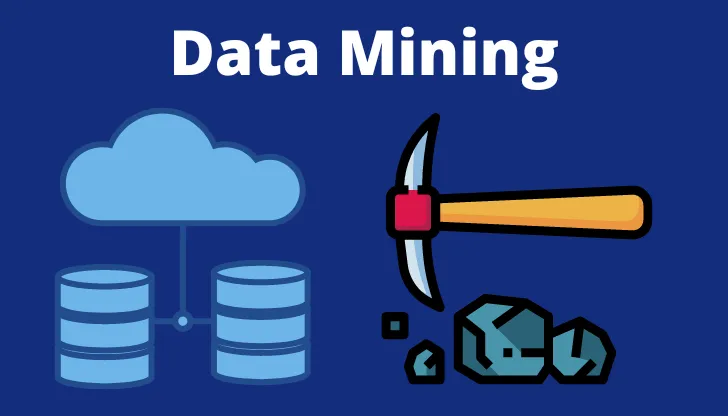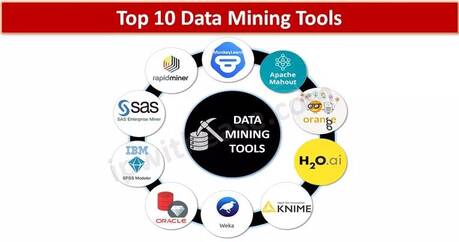
Introduction to Data Mining Tools
Data mining is the process of discovering hidden patterns and insights in large datasets. It involves the use of statistical and mathematical algorithms to identify trends and relationships within the data.
Data mining tools are software applications that provide businesses and organizations with the ability to extract useful information from their data. In this article, we will explore the benefits of using data mining tools and take a closer look at some of the most popular options available.
What is Data Mining?
Data mining is the process of analyzing large datasets to discover patterns and insights that can be used to make informed decisions. It involves the use of statistical and mathematical techniques to identify relationships within the data and to predict future outcomes. Data mining is commonly used in fields such as marketing, finance, healthcare, and telecommunications.
Why Use Data Mining Tools?
Data mining tools provide businesses and organizations with the ability to analyze large datasets quickly and efficiently. They allow them to identify patterns and insights that may be difficult or impossible to see with the naked eye, leading to better decision-making and improved outcomes. Additionally, data mining tools can save time and reduce costs by automating the process of data analysis, allowing organizations to focus on other important tasks.
Popular Data Mining Tools

There are many data mining tools available, each with its own strengths and weaknesses. Here are five of the most popular options:
IBM SPSS Modeler
IBM SPSS Modeler is a data mining tool that allows businesses to analyze large datasets using a variety of statistical and mathematical techniques. Its user-friendly interface makes it easy for organizations to quickly and easily extract insights from their data.
RapidMiner
RapidMiner is an open-source data mining tool with a wide range of functionality. Its drag-and-drop interface allows users to quickly build predictive models, and its automated features make it easy to work with large datasets.
SAS Data Mining
SAS Data Mining is a powerful tool that allows businesses to analyze large datasets using a variety of statistical and mathematical algorithms. Its user-friendly interface and extensive documentation make it a popular choice for organizations of all sizes.
Oracle Data Mining
Oracle Data Mining is a data mining tool designed for use with Oracle databases. It provides businesses with the ability to perform predictive analytics on their data, allowing them to make data-driven decisions.
Weka
Weka is an open-source data mining tool that provides businesses and organizations with a wide range of functionality, including data preprocessing, clustering, classification, and regression. Its user-friendly interface and extensibility make it a popular choice for data scientists and analysts.
Key Features of Data Mining Tools
Data mining tools offer a variety of features that allow businesses and organizations to extract insights from their data. Here are some of the key features to look out for:
Data Preparation and Exploration
Data mining tools should offer functionality that allows users to clean and prepare their data for analysis. This may include tools for removing duplicate records, filling in missing data, and transforming data into a format that is suitable for analysis.
Visualization and Reporting
Data mining tools should provide users with the ability to create visualizations and reports that illustrate their findings. This may include charts, graphs, and tables that provide an at-a-glance view of key insights.
Predictive Modeling
Predictive modeling is an important feature of data mining tools, as it allows businesses to make predictions about future outcomes based on their data. This may include tools for regression analysis, decision trees, and neural networks.
Machine Learning Algorithms
Machine learning algorithms are a key component of data mining tools, as they allow businesses to automatically learn patterns and insights from their data. This may include algorithms for clustering, classification, and association rule mining.
Benefits of Using Data Mining Tools
Data mining tools offer a variety of benefits to businesses and organizations. Here are three of the most important:
Improved Decision Making
By extracting insights from their data, businesses and organizations can make more informed decisions. This can lead to better outcomes and a competitive advantage in the marketplace.
Increased Efficiency and Productivity
Data mining tools can automate the process of data analysis, allowing organizations to focus on other important tasks. This can increase efficiency and productivity and reduce the amount of time and resources required for data analysis.
Time and Cost Savings
By automating the process of data analysis, data mining tools can save organizations both time and money. This can be particularly important for businesses that are working with large datasets or that require frequent data analysis.
How to Choose the Right Data Mining Tool for Your Business
Data mining tools can help businesses identify patterns, trends, and insights from vast amounts of data. But with so many options available, it can be challenging to choose the right tool for your business needs. Here are some factors to consider when selecting a data mining tool:
Identifying Your Business Needs
Before choosing a data mining tool, it is essential to identify your business needs. Ask yourself questions such as what data you need to mine, what insights you want to gain, and how you plan to use the results. Understanding the specifics of your business needs will help you narrow down your choices.
Budget Considerations
Data mining tools come at different price points, and the cost can vary widely. It is essential to consider your budget and determine how much you are willing to spend. Keep in mind that more expensive tools do not necessarily mean more effective tools.
User-Friendliness and Ease of Integration
Another essential factor to consider is the user-friendliness and ease of integration of the tool. Some tools require a high level of technical expertise, while others are more user-friendly and accessible. It is also crucial to consider how well the tool integrates with your other software and systems.
Data Mining Ethics and Challenges
While data mining can be a valuable tool for businesses, it also raises ethical and practical challenges that must be addressed. Here are some of the most critical issues to consider:
Data Privacy and Security
Data privacy and security are critical concerns when it comes to data mining. Make sure you are using data ethically and within the legal framework of your jurisdiction. Ensure that the data is stored securely and accessible only to authorized personnel.
Biases and Fairness
Data mining can uncover hidden biases and perpetuate unfair practices if the data used is not representative of the population. Ensure that the data is unbiased and that the results are fair to all parties involved.
Interpretation and Communication of Results
Interpretation and communication of results are essential to ensure that the insights gained from data mining are correctly interpreted and communicated. It is crucial to approach the results with a critical eye and ensure that they are communicated appropriately to avoid misinterpretation.
Future of Data Mining Tools
The future of data mining tools is exciting and full of possibilities. Here are some advancements to look forward to:
Artificial Intelligence and Machine Learning Advancements
Artificial intelligence and machine learning will continue to revolutionize data mining tools. These advancements will enable the tools to learn from data and make increasingly accurate predictions and recommendations.
Integration with Big Data and Cloud Computing
The integration of data mining tools with big data and cloud computing will make it possible to mine vast amounts of data more efficiently and cost-effectively. This integration will also make data mining tools more accessible to businesses of all sizes.
Conclusion and Recommendations
Data mining tools can help businesses gain valuable insights from vast amounts of data. To choose the right tool for your business needs, consider your budget, user-friendliness, and ease of integration. Be sure to address ethical and practical challenges such as data privacy and security, biases and fairness, and interpretation and communication of results.
Summary of Key Points
When choosing a data mining tool, consider your business needs, budget, user-friendliness, and ease of integration. Ethical and practical challenges such as data privacy, biases, and interpretation of results must be addressed. Artificial intelligence and machine learning advancements and the integration with big data and cloud computing are future advancements to look forward to.
Recommendations for Successful Implementation
Ensure that you have a clear understanding of your business needs, and choose a data mining tool that aligns with those needs. Train your team on how to use the tool effectively and efficiently. Monitor the results regularly and make adjustments as needed. Finally, ensure that you approach data mining ethically and within the legal framework of your jurisdiction.In conclusion, Data Mining Tools are vital for businesses seeking to remain competitive in today’s data-driven world. By leveraging these tools, businesses can improve their operations, gain insights into their customers’ behavior, and identify potential areas for growth and optimization. However, businesses must also be aware of the ethical implications and challenges associated with data mining. By taking these into consideration and following our recommendations, businesses can successfully implement Data Mining Tools and reap the rewards of this powerful technology.
FAQs
What is Data Mining?
Data Mining is the process of discovering useful patterns and knowledge from large datasets. It involves analyzing and extracting data from various sources to identify trends, patterns, and relationships that are not apparent to the naked eye.
What are the benefits of using Data Mining Tools?
Data Mining Tools offer several benefits, including improved decision making, increased efficiency and productivity, and time and cost savings. By leveraging these tools, businesses can gain valuable insights into their operations, customers, and market trends, enabling them to make informed decisions that drive growth and profitability.
What are the ethical considerations associated with Data Mining?
Data Mining raises several ethical concerns, including data privacy and security, biases and fairness, and the interpretation and communication of results. Businesses must ensure that they are collecting and using data in an ethical and responsible manner, avoiding any potential harm to individuals or groups.
How do I choose the right Data Mining Tool for my business?
To choose the right Data Mining Tool for your business, you must first identify your business needs and budget considerations. You should also consider the user-friendliness and ease of integration of the tool, as well as any technical support or training provided by the vendor. It is also helpful to read reviews and compare features of different tools to find the one that best meets your requirements.